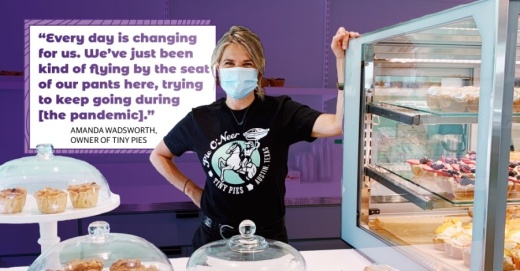She and her mother, Kit, launched their small business, Tiny Pies, in 2011—but there is nothing small about the business’s growth.
Since 2011, Tiny Pies has expanded into three Austin-area locations, and orders are now shipped nationwide.
Wadsworth was preparing to celebrate the grand opening of her third location in West Lake Hills just in time for Easter. Then, the coronavirus pandemic hit Central Texas and caused her to delay the opening.
Despite being an experienced business owner, Wadsworth said she almost feels like she’s back in “startup mode.”••“Every day is changing for us,” Wadsworth said. “We’ve just been kind of flying by the seat of our pants here, trying to keep going during [the pandemic].”••Tiny Pies’ third retail location finally opened in June—a move Wadsworth described as a leap of faith.
Despite the ongoing obstacles, delays and uncertainties caused by the pandemic, small business owners such as Wadsworth are fighting to stay afloat.
Unfortunately, much like downtown Austin, the Lake Travis-Westlake region has seen its share of business closures since March — Steiner Ranch’s Galaxy Cafe, Lake Travis’ Lucy’s on the Lake and Westlake’s Biderman’s Deli, to name a few.
However, several new restaurants and cafes have recently opened in the area, and more are preparing to launch this fall. In many cases, companies less than a year old did not qualify for federal or local coronavirus relief funds and without access to assistance, new business owners told Community Impact Newspaper they took a financial risk in opening.
New restaurants push to open
In nearby Bee Cave, another bakery was gearing up for its grand opening. Foliepop’s, a new French pastry cafe, opened within the Hill Country Galleria in July. The family-operated shop, owned by Executive Chef Antonie Chassonnery and Chief Executive Officer Audrey Sigoure, offers customizable pastries.
Much like Tiny Pies, the Foliepop’s team hoped to introduce the community to their new concept in early spring until the pandemic struck. Since then, the team has had to overcome several challenges.
As a result of the health crisis, Foliepop’s was hit with several delays such as a slower than expected construction process. Work on the cafe’s adjacent kitchen space lagged, according to Adrien Lavinge, director of marketing and Sigoure’s cousin.
Lavinge noted while the pandemic was certainly not the most ideal time to start a new business, he and his family never strayed from their goal.
“The reason why there’s all these new [restaurants] opening is because it was planned prior to the pandemic,” Lavigne said. “In our case, we weren’t going to stop. We’ve been working on it for two years ... we were just too committed.”
Foot traffic is still slow at the galleria, according to Lavigne, but customers and surrounding business owners have been excited about Foliepop’s. In part, Lavinge attributes some of that success to being a family-operated company.
“As a family business, it’s really been helpful for us to have that support. I think without it, [opening] would have been a lot harder,” Lavigne said.
In Lakeway, another family-owned restaurant recently started.
In October, Billy-Joe Hunt and his wife Suzanne opened The Gramercy, an upscale restaurant and bar with a 1920’s inspired ambiance.
Hunt left a corporate career to pursue his dream of owning a restaurant—a wish that has been at least 20 years in the making. When he discovered his family lineage tied to The Gramercy Park Hotel in Manhattan, inspiration struck.
Hunt signed the restaurant’s lease in January and not long after he heard early mentions of the coronavirus. If Hunt knew how substantial the pandemic’s impact would be, he said he likely would not have taken the chance.
“We may not have gone down that path at all ... but once the train starts rolling it takes a lot to stop it,” Hunt said. “At some point, you just have to make the call and say ‘we’re going to do it’ and collectively as a team, we just decided to go for it.”
While the pandemic has created a number of hurdles for new and soon-to-open eateries, established restaurant owners are facing their own set of challenges.
David Fernandez, the owner of Frog & the Bull in the Four Points area, opened the Iberian restaurant in November 2019 and said business was starting to pick up in early March. Just as sales began to trend upwards, the pandemic arrived and Travis County and Gov. Greg Abbott temporarily halted indoor dining.
With dining on hold, Fernandez said he had to furlough all but four employees and personally cover the restaurant’s expenses. Simultaneously, the restaurant shifted from not offering to-go service to becoming what Fernandez called a “food truck without wheels.”
“I’ve more or less had to make up the difference and let’s just say everyone’s getting paid but me,” Fernandez said.
To be eligible for the federal Paycheck Protection Program loans or Travis County’s Small Business Grant Program, a company had to be operating in March 2019. Since Frog & the Bull is less than a year old, Fernandez said he has not received any financial assistance. Dine-in customers slowly returned as Abbott permitted restaurants to open with limited capacity, according to Fernandez. As of Sept. 21, restaurants are permitted to serve up to 75% occupancy, but Fernandez said while customers have slowly returned, there was no rush back to indoor dining.
According to Fernandez, business remains unpredictable. Frog & The Bull will experience a busy Friday followed by a very slow Friday the next week. The changes make it difficult for Fernandez to plan, which in return has created a costly business model.
As the holiday season approaches, restaurants traditionally see a dip in sales, which is something Fernandez said he will need to prepare for. He’s looking at ramping up marketing to boost his takeout service.
Despite a challenging first year in business, Fernandez’s goal hasn’t changed: to be recognized as one of the best restaurants in the Austin area.
“I’ve determined I’m not going down without a fight,” Fernandez said.“The moral of the story, it has been tough but we have survived. Things are, albeit painfully slowly, getting better, but at least they’re getting better.”





